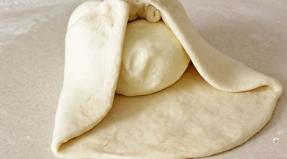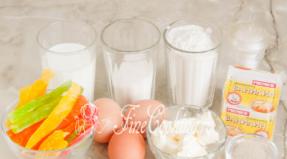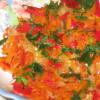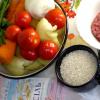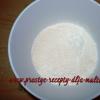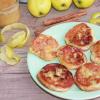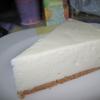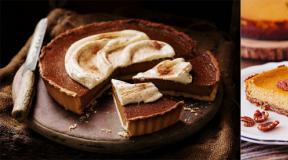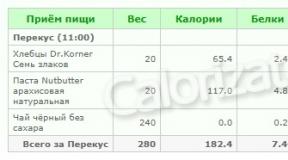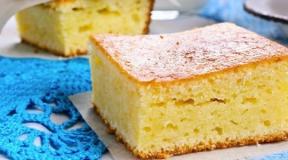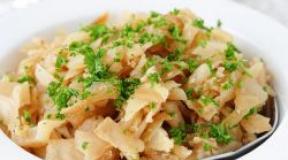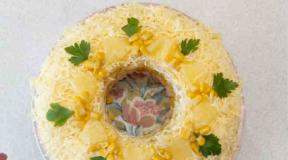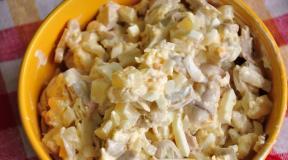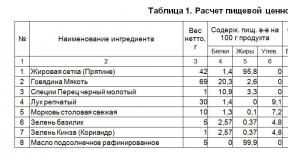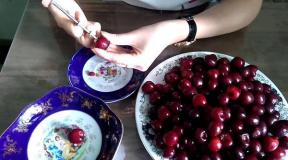Pancakes without eggs stick to the pan. There's no better old pancake pan
Whatever they say, but folk wisdom is real wisdom and just doesn't assert anything. All proverbs do not arise from scratch, they are based on long observations of our life. This statement fully applies to the well-known proverb about the first pancake, about the one that is "lumpy".
Of course, if this does not concern us personally, then you can laugh, and if it happens to us, then there is no laughing matter. Moreover, such an "adventure" often happens not only with the first pancake, but with almost half of them.
We will try to give some tips on how to avoid unpleasant moments during the preparation of pancakes, after all, this is a nuisance. And if the guests are still waiting for pancakes in the house, and then “this” happened, then in general I want to cry. Unfortunately, not many housewives managed to avoid such a fate.
To increase the number of happy women, we will tell you how to make the process of making pancakes pleasant and not "nervous". This article contains tips from many sites, we tried to systematize them and “dilute” them with personal experience, we have it not small.
Many people advise using a separate pan for making pancakes. The advice is correct, but only partially. It all depends on what metal your pan is made of. If made of or aluminum - everything is correct, but this advice does not apply to other pans. Why? The fact is that on cast-iron and aluminum pans during frying, a hard film of fat forms, which prevents pancakes from sticking. By the way, the same film protects cast iron from rust.
You, of course, will wash the pan after the pancakes, but after one wash the film will not wash off, this will help to successfully cook pancakes next time. If you wash the pan several times after cooking various dishes, the film will wash off, and the next pancakes will start to burn again until the pan “gets used”, gets old and “dirty” with burnt oil.
You have started to fry pancakes in an underheated skillet. This advice is completely true. The pan must be heated with oil until the first "haze" appears - this is an indispensable condition for cooking.
It's all about the same protective film. And during frying, the pan should be well heated. Otherwise, not the first pancake will begin to stick, but all the following ones. Of course, only a more or less experienced housewife can immediately determine the degree of heating of the pan. The rest have to check the temperature with the "first pancake".
Pancake dough too lean. It is imperative to add oil to it, this will improve the taste of the beans, and will be an additional insurance against burning. Do not forget to stir well after adding butter to the dough. The "operation" will take a little time, but you will immediately see the positive effect. If you have a lot of dough, then even during frying periodically stir it additionally, the oil tends to accumulate at the surface.
The dough is too thin. You should already know what kind of dough to make. Of course, you cannot bend in the other direction, otherwise your pancakes will be tough and resemble poor little buns. Another. If you have a lot of baking soda in your dough, it will negatively affect the quality of the pancakes. Soda makes pancakes very crumbly and they can burst at the slightest load. You don't even need them to stick, they can break during an ordinary overturning.
Some "advisers" argue that pancakes should be cooked only in a dry frying pan. Rest assured, they either fry themselves in a greased frying pan, or have never cooked pancakes in their life. Of course, you can carry out such a procedure in a frying pan, they will not burn on it if oil is added to the dough. But pancakes without butter taste like the sole of an army boot. Decide what you want to eat. If we turn to the same folk wisdom, then it says that you can't spoil a pancake with butter, and not vice versa.
Don't save too much oil when frying. Of course, they shouldn't float in it like patties, but a dry skillet does not improve the quality of pancakes. Do not forget to distribute the oil evenly over the entire surface of the pan, add it before each pancake. Again - without fanaticism, with a sense of proportion.
One of the oldest and most reliable tips is to grease the pan with an ordinary piece of raw bacon. Put it on a fork and wipe the entire surface of the hot pan with lard before placing a new portion of pancakes. By the way, if it does not start to heat, then the pan is not warmed up enough - one more protection against "lumpy pancakes", there is time to warm up the pan. Believe me, the bacon will melt exactly as much as is needed for one portion, there will never be neither less nor more. It is also the most economical way. You save on both butter and pancakes, which will no longer be lumpy.
Do not in any way use a new pan. Even if you have performed all the recommended manipulations with it - calcining, steaming, and so on. A new frying pan will not cope one hundred percent with pancakes, it is her fault, and you will be responsible. Is it necessary? We would generally advise using the oldest frying pan whenever possible, this technique has been confirmed by many housewives.
One could still continue, but these tips are quite enough. Each of us has our own little secrets and considers only them the only correct ones. One more thing. It seems to many that this advice can be ignored, but this is not at all the case. By the way, if we turn to folk wisdom again, it confirms our advice. Cook pancakes in a good mood, love yourself and those for whom you are cooking.
The good mood will definitely be passed on to the pancakes, and they will try to support it! And even if something does not work out, it is not a global catastrophe, not a great grief! Do not take everything to heart, more smiles and joy. Then even this pancake, which is "lumpy", will seem to your household the most delicious.
Pancakes are a dish that is perfect for a festive table, and for the most ordinary breakfast. Many housewives love to cook them. However, sooner or later, everyone is faced with one problem: pancakes stick to the pan, it is not known what to do. Let's consider why this can happen and how to deal with it.
Pancakes are not removed from the pan. What to do?
Even an experienced hostess may have such a problem. It would seem that everything is done according to the recipe, but all the same, the pancakes are not removed from the pan, burning or tearing when you try to turn them over.
There are several reasons why pancakes can stick to the pan:
- Non-compliance with the recipe;
- Incorrect dough consistency;
- Frying pan coating problems;
- Insufficient heating of the pan.
When these problems are dealt with, the pancakes will easily turn out the way you want them. And if you use our original methods, even such a simple dish will become a real festive dinner.
Non-compliance with the recipe
Often experienced housewives add ingredients "by eye" when preparing the dough. But at the same time, there is a possibility that some component will be in excess, or, on the contrary, something will be missing. For instance:
- Not enough eggs will cause the pancakes to be crumbly and pale.
- Too much baking soda won't do anything good either: the pancakes stick to the pan and tear when turned over.
Important! To avoid such a problem, you need to carefully read the recipe and observe the proportions.

If you nevertheless confused something during cooking or the wrong proportions were indicated in the recipe, then you will have to think a little to correct the situation.
What to add to the dough so that there are no problems with baking?
Eggs
Chicken eggs are the dough glue for this dessert. In addition, it is they who give the finished pancakes their rosy color and elasticity. But there are recipes in which there is no mention of eggs, as a result, the dough turns out to be loose, and the pancakes do not want to turn over and break.
The way out of this situation is simple: add a couple of eggs to the dough and try baking a pancake. If there is no result, you can add more eggs.
Important! After adding eggs, the pancakes will bake faster, get a more beautiful shade, and you can forget about the dryness of the edges.

Soda
Baking soda is added to kefir and sour milk pancakes. Soda removes excess acid, making the pancakes more fluffy. But it must be added strictly according to the recipe, since with an excess of soda, the dough will lose its stickiness, and it will not work to turn the pancake. In addition, the taste of the dish will change.
Important! If you still overdo it when adding soda, then you need to make a separate batch without soda, and then pour it over the spoiled dough.
Butter
Vegetable oil should be added directly to the dough. This will make it softer and the pancakes will get a special taste. Additionally, the butter will create additional separation between the pancake and skillet, making the pancakes less likely to stick. 
Sugar
Excess sugar in the dough leads to the so-called “caramel” effect - the pancakes stick to the pan due to the burnt sugar. Therefore, it is recommended not to add foods containing a lot of sugar to the batch. It is better to serve sweets for the finished dish.
Separately, you can use the selection to make them even tastier.
Incorrect dough consistency
The result depends on the consistency of the dough. The thicker it is, the denser and thicker the pancakes will be. That is why inexperienced housewives make completely batter for thin pancakes. As a result, the water evaporates and the pancakes stick to the pan, becoming dry and brittle.
You can avoid problems by bringing the dough to the desired consistency: by adding water, milk or flour.
Important! The water and milk should be warm, because when cold water is added, the flour may not fully stir, forming lumps, and hot water will spoil the taste of pancakes.
The consistency of the finished dough should be thicker than kefir, but thinner than sour cream.

Pan coating problems
This is another answer to the question "Why do pancakes stick to the pan?" Similar problems arise if the frying pan is new or, on the contrary, old.
Problems can arise when using a new frying pan that just arrived at your home from the store shelf. To avoid these:
- You can first carry out a "run-in": fry something so that a fatty layer forms on the surface. After that, you can safely start making pancakes.
- You can also heat the pan before use. To do this, salt is poured into it, and the pan is heated over a fire or in the oven for an hour, occasionally stirring the salt. After calcining, the salt is poured out, and the frying pan is wiped with a cloth and greased with oil, fat or lard.
Important! You need to lubricate not only the bottom of the pan, but also the sides, since dough often spreads there too.

The pan you use must be cleaned periodically, otherwise it can become another cause of food sticking. Here are some tips on how to clean your pan to prevent the pancakes from sticking:
- You can use normal detergents by rinsing and rinsing the pan thoroughly. Then it remains only to dry it and grease it with oil.
- It is not necessary to use detergents to clean the pan. It is often enough to fill the dishes with water, adding a little salt or soda before washing. The result will be even more effective than using dishwashing detergents.
- It is recommended to use rags or soft sponges when washing dishes used for frying pancakes.
Important! Do not use iron sponges or hard brushes to clean the pan. They damage the coating of the pan and cause the food to burn continuously.
A popular proverb says: "The first pancake is always lumpy." But as practice shows, not always, and subsequent pancakes turn out as it should. Today we will find out why pancakes stick to the pan and break, in what ways to fix it.
Why do pancakes stick to the pan?
Not every housewife knows how to skillfully bake pancakes. But this does not mean that all attempts should be abandoned. There are a lot of reasons why pancakes stick.
The "Wrong" Pancake Dough
At least 70% of baking success depends on the pancake dough. Incorrect proportions, ingredients, etc. Let's analyze what mistakes we make when preparing a pancake base.
Flour
Flour is essential for making any dough, especially pancake. First of all, it is necessary to choose flour of the highest grades. Peeled flour is not suitable for making batter because of the low degree of purification and uneven grinding. The proportions are also important. If you add a little flour, the dough will be thin. Consequently, thin pancakes stick strongly to the pan, and it will be difficult to turn them over. Too much flour in the dough will turn the pancakes into pancakes.
Excess sugar
Even if you like sweet pancakes, don't get carried away with adding sugar to the dough. Sugar syrup thins the dough, breaking the density. In addition, the copious amounts of sugar make the pancakes burn and stick to the surface of the pan.
Chicken eggs
The ideal pancake dough cannot be made without chicken eggs, but it is important not to overdo it with their number. Eggs give the dough elasticity and firmness, but the abundant protein content turns the finished pancake into a crispy waffle that tastes like an omelette.
Lack of oil
Lack of oil in the dough will impair the taste of the pancakes For the same reason, they begin to stick to the pan and turn over with difficulty. We recommend adding a few tablespoons of butter to the dough, as well as greasing the bottom of the dish with butter or any other cooking oil. But do not pour a copious amount of vegetable oil into the pan, as excess fat can deep fry and dry the edge of the pancake.
if you use the correct recipe and baking technique, the pancakes are thin, tasty and do not stick to the panWhy do pancakes stick to the kefir pan?
Do not be surprised if kefir pancakes stick to the pan and are very torn. The reason lies in the composition of the fermented milk product. In combination with sugar and protein, it reacts. The disadvantage of this recipe is that the pancakes, being very soft and tender, easily stick to the dishes or break at all when you try to turn them over with a spatula. To reduce the risk of spoiled pancakes, it is recommended to dilute kefir with water in a ratio of 2/1.
Why do pancakes stick to a skillet in milk?
High fat milk
You bake pancakes in milk, following all the rules and recipe, but they still stick to the pan? The reason may lie in the high fat content of milk. This problem can be solved by adding water and baking soda to the tip of a knife. After the performed manipulations, the dough should be carefully removed and allowed to stand for 10-20 minutes. Water will reduce the amount of fat, soda will give airiness to the pancakes.
Cold milk
Low milk temperatures can also be the cause of failed pancakes. As a rule, the dairy product from the refrigerator is not able to dissolve the rest of the ingredients. For example, undissolved sugar and salt will melt directly in the pan, pancakes will burn and stick. It is better to use milk at room temperature, or warm it up a little. The main thing is not to overdo it, otherwise the egg white will curdle at high temperatures.
Low-quality dishes
Cast-iron pan
The quality of the dishes plays an important role in baking pancake baking. In ancient times, people used exclusively cast iron pancake pans. The thick bottom ensured uniform heating of the dishes, evenly frying the product. Cast iron does not emit substances when heated and is absolutely safe for our body. But thin pancakes stick to a cast iron skillet, so generally cookware made from this material is more suitable for pancakes and pancakes. Nowadays, modern technologies have made it easier for housewives to lift heavy and uncomfortable pans, replacing cast iron with induction pancakes.
Induction pan
Induction pancake pans are easy to use thanks to their light weight and non-stick Teflon coating. The absolute advantage of such dishes is that you can bake pancakes with a minimum of oil. Important: a frying pan with a Teflon layer should be intended exclusively for baking pancakes; it is not recommended to cook on it all the time.
How to fry pancakes so they don't stick?
There are little tricks for skillfully preparing pancake dough. We will find out the secret of perfect pancakes that do not tear or stick to the pan.
Pancake dough
When kneading the pancake mixture, it is necessary to achieve a uniform consistency. We advise you to first add flour to the a large number of liquid, gradually topping up. This way you will avoid clumps and achieve the perfect texture. After kneading the dough, it is recommended to let it stand for 10-15 minutes so that the flour forms stickiness
Ingredient temperature
It is better to take all the ingredients for the pancake dough at room temperature. When making pancakes with sour milk, it is permissible to heat the sourdough to 30 degrees for the formation of ruddy bubbles under the influence of lactic acid and sugar. In addition, such a dough is easier to knead, since the flour does not lump.
How to pour pancake dough into a frying pan?
Preheat a dry skillet over medium heat. Then grease the bottom of the pan with oil, pour a small amount of dough in the center and quickly, with rotary movements, distribute it over the entire surface of the pan. In this way, we will achieve uniform roasting and thickness of the pancakes.
We have figured out how to properly prepare the dough and what is missing if the pancakes stick to the pan. Remember that the speed and quality of any baking depends not only on adherence to the recipe, but also on experience. And it, as you know, arises by trial and error.
Many young housewives do not know why pancakes stick to the pan. The solution to this problem is quite simple - you need to choose the “right” pan and knead the dough correctly.
Top Reasons Why Pancakes Stick To Your Frying Pan
To bake thin and tasty pancakes, evenly fried, you first need to choose the right pan and prepare it for cooking.
Choosing the right cookware and heating it up



For baking thin, delicate pancakes, cast iron and aluminum pans are most suitable. The fact is that a film of fat forms on such materials during frying, which prevents the pancakes from sticking to the bottom of the dish. Therefore, if you have grandma's cast-iron frying pan, it is quite suitable for pancakes.
But pancakes can even stick to cast iron and aluminum. Here, the problem may lie in the improper preparation of the pan, or rather, heating it. If the dishes have been thoroughly washed with the product, then the thin film of fat has collapsed. Therefore, before frying, the pan is well ignited until a slight smoke appears.
The perfect recipe for pancakes that won't stick
But what can you do if the pan is suitable and heated correctly, but the pancakes still stick a lot? The dough may have been mixed incorrectly.
If the pancakes stick to the skillet and break, try the perfect recipe kneading with raw milk and vegetable oil.

Required:
- 2 tbsp. flour;
- 3 eggs;
- 1.5 tbsp. l. Sahara;
- 2 tbsp. l. sunflower oil;
- 1 tbsp. milk;
- 2 tbsp. carbonated mineral water;
- 1 tsp salt.
Making the perfect pancakes:
- Heat the milk slightly and pour it into a large bowl.
- Pour in mineral water and sift flour into a bowl, allow until the lumps disappear.
- Add all other ingredients and beat the dough with a mixer.
- Let the pancake batter rest for 15 minutes.
- Stir well again with a whisk and bake.
Pancakes according to this recipe can be served with various fillings, jams, sauces, sour cream and cream. Each fried pancake must be greased immediately after frying with butter.
For a long time, there has been an expression among the people about the first pancake, which must necessarily turn out to be lumpy. But, the truth of life is such that not only the first, but also all subsequent ones can crumple or, even worse, stick to the pan.
And then a reasonable question arises: why do pancakes stick to the pan and tear? And the main thing is how you can fix it.
Why do pancakes stick to the pan? Not everything is as simple as it seems, but that shouldn't stop you. The reasons can be very different.
Why do pancakes stick to the pan
Briefly about the culprits of excessive stickiness:
- Dishes, or rather a frying pan.
- Flour of inadequate quality.
- Errors in ingredient proportions.
- The products included in the composition were added cold.
- Not enough salt and oil, too much sugar.
To understand why pancakes stick, let's take a closer look at each point:
- So, what can cause pancakes to stick to the pan? First, there may be a problem in the pan itself. The pan should be cast iron with low edges. If you don't have a cast-iron one at hand, you can take an ordinary one, but with a thick bottom. To make it work, first heat the salt in it, and then pour it out, wipe it with a napkin and grease it with vegetable oil.
- The most delicious and not sticky pancakes are made from first or highest grade wheat flour. It is better to buy flour in paper bags rather than cellophane ones. Note that the proper quality flour squeaks and does not stick to your fingers.
- Recipe with optimal proportions: Sift 300 grams of wheat flour and pour 1 liter of milk into it. Stir well to remove the lumps. Now add some beaten eggs 2 pieces, 1 tablespoon sugar, 2 tablespoons sunflower oil and 1 teaspoon salt. The consistency of the dough should be similar to sour cream.
- All ingredients must first be brought to room temperature. And then knead the dough for pancakes.
- Salt also affects frying pancakes, at least 1 teaspoon of salt should be added to the dough.
- Pancakes can stick to the pan and tear due to too much sugar.
- Vegetable oil is an equally important ingredient, and among other things, the dough must be allowed to brew for 20 minutes.
How to solve the sticking problem
And yet, what if the pancakes stick to the pan? Further actions are directly related to the above points. That is, it is very important to monitor the quality of flour and observe proportions. If you think the pancake dough is too runny and they stick to the pan, add more flour. If, on the contrary, the dough is too thick, then bring it to the desired consistency, gradually pouring in water or milk.
When choosing eggs, choose a medium size, because pancakes break if there is too much protein in the dough. And he, in turn, gives brittleness when frying.
While not enough oil can cause the pancakes to stick together in the pan, too much oil will deep-fry them. In this case, the dough is no longer torn, but the taste is no longer the same. Therefore, if you have difficulty frying due to the oil, add it to the dough. If it turns out to be an excess, you will have to add flour and milk (water) and knead everything again.
Pancakes often burst if fatty milk or kefir is present in the dough. How to solve a problem? It is very simple to dilute kefir (milk) in a ratio of 2 to 1. That is, pour the required amount of water into the prepared mixture, while monitoring the consistency of the dough.
To pamper your family with delicious pancakes, be sure to follow all the recommendations given. If something does not work out, do not be afraid to experiment, because everything comes with experience.
